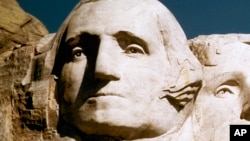Monday is Presidents' Day in the U.S.
Millions of workers and school children are getting a day off for the annual holiday. Many patriotic and historical groups use the day for staging celebrations and reenactments of historical events.
It first became a federal holiday in 1879 to celebrate the February 22 birthday of George Washington, the first U.S. president.
Nearly a century later, in 1968, Congress passed a law shifting the celebration of several federal holidays from specific dates to predetermined Mondays in order to give workers three consecutive days off.
Initially, Presidents' Day only applied to the nation's capital, but in 1885 it was expanded to the rest of the country.
Retailers take advantage of the holiday - held on the third Monday in February - to have special sales.
By a quirk in the calendar, honoring George Washington on the third Monday of the month means the holiday can never fall on his actual birthday.
Although the day is still officially known as Washington's Birthday, it has evolved into Presidents' Day to celebrate both Washington's birthday and Abraham Lincoln's birthday, the 16th president whose birthday falls on February 12. Lincoln's birthday was never an official federal holiday, although many states celebrated the day.
Washington's birthday holiday originally joined only four other nationally recognized federal bank holidays - Christmas, New Year's Day, Independence Day and Thanksgiving. It was the first holiday to celebrate the life of an individual American. Martin Luther King, Jr. Day, signed into law in 1983, was the second.




